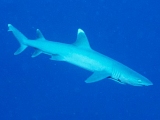Saturday, October 08, 2005
No More Shark Fishing in Red Sea
 A recently issued Eyptian decree will finally ban shark fishing in the Red Sea. This gives the conservation association HEPCA the legislative means to put a stop to the dozens of shark massacres that are reported daily throughout Egypt's Red Sea coastline from Hurghada to Marsa Alam
A recently issued Eyptian decree will finally ban shark fishing in the Red Sea. This gives the conservation association HEPCA the legislative means to put a stop to the dozens of shark massacres that are reported daily throughout Egypt's Red Sea coastline from Hurghada to Marsa AlamShark fishing has, theoretically, been illegal since 1973, when Egypt became one of 100 countries to sign the CITES (Convention of International Trading of Endangered Species) Treaty. Sharks in the Red Sea were on CITES' list of endangered species, but the Egyptian law that regulates fishing made no mention of sharks.
"Sharks are a valuable source of revenue for the country. Many people don’t realize that tourists spend millions of dollars in the Red Sea because of the sharks. For example, a dive destination like the Brother Islands (off the coast of Marsa Alam) is sold primarily because of its abundant shark population. It has been estimated that each shark in the Red Sea generates approximately 10,000 pounds sterling in income to the country," said HEPCA's Director.
The problem began to reach alarming levels in 2000, when divers and conservationists started noticing a marked decrease in shark populations. The decline in numbers was mainly attributed to an increase in the number of fishing boats in the Red Sea.
This new wave of commercial fishing, coupled with the rise of a handful of trading companies that were being established solely for the purpose of exporting in-demand seafood delicacies (including sea cucumbers and shark fins) to the Chinese market, were an environmental catastrophe in the making.
It is difficult to quantify Egypt’s current shark population and how much it has suffered over the years, but divers claim that sites near Sharm El-Sheikh and Hurghada that have always been known as prime shark viewing destinations are becoming less and less inhabited with by sharks.
More info: http://www.egypttoday.com/article.aspx?ArticleID=5918
--
Subscribe to SCUBA News for more free news, articles, diving reports and marine life descriptions - http://www.scubatravel.co.uk/news.html
